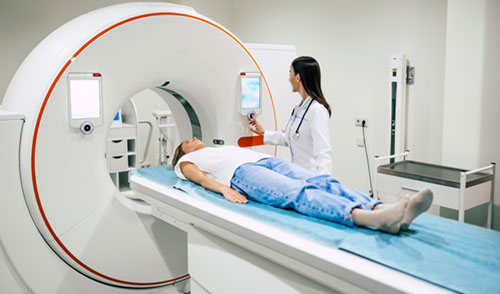A Calcium Score Test – What Is It?
- A calcium score test is nothing but a CT scan that gives us an idea about the amount of calcium deposited in our coronary arteries. This gives us an indication of plaque build-up in them. The plaque build-up can narrow down the arteries or even block them completely resulting in a heart attack.
- A calcium score test is quick and noninvasive. You can return to normal activities right after the test.

Who Should Get a Calcium Score Test?
The test is recommended for people in the age group of 40-70 years who have a risk of heart disease but who are not exhibiting any symptoms.
By risk of heart disease, we mean:
- People with a family history of cardiac conditions.
- People who smoke or use any form of tobacco (at present or in the past).
- People with a diabetic condition, hypertension or high cholesterol.
- People who are obese or overweight.
- People who lead sedentary lives.
Those who are below 40 years but whose families have a history of high cholesterol can consider getting this test done. This test is not an absolute predictor for heart attack or stroke. Rather, it is a tool to see if further assessment is needed.
Who Should Avoid a Calcium Score Test?
Pregnant women should not undergo this test. It can be harmful to the fetus. A calcium score test may not be helpful in the following scenarios:
- The person is already diagnosed with coronary artery disease.
- The person exhibits symptoms of coronary artery disease.
- The person has been treated for coronary artery disease.
A calcium score test is not helpful in finding out whether the treatment plan for a heart condition is working.
How Is the Test Performed?
The test makes use of a CT machine to scan the heart and detect calcium deposits. While the scanning itself takes just a few minutes, the entire duration of the test could be around 10-15 minutes. The test has the advantages of being fast, safe and non-invasive.
| Calcium Score | Plaque | 10 Year Heart Attack Risk | 10 Year Heart Attack Risk |
| 0 | No evidence of plaque < 5% risk of CAD | 1-2% | Quit smoking, exercise more and eat better |
| 1-10 | Small amount of plaque < 10% risk of CAD | 2-6% | Quit smoking, exercise more and eat better |
| 11-100 | Plaque present, you most likely have nonobstructive CAD | 2-6% | Consult cardiologist, eat better and quit smoking |
| 101-400 | You have CAD and you may have obstructive CAD | 13-16% | Consult cardiologist; may require further tests |
| > 400 | You have CAD with > 90% chance of significant CAD | 22-29% | Consult cardiologist; may require further tests |
| >1000 | You have significant CAD | 37% | Consult cardiologist |
Getting Ready for a Calcium Score Test
Prior to the test:
- Inform the provider of the pregnancy or even a suspected pregnancy.
- Avoid food, drink, caffeine and any form of tobacco for four hours before the test.
- Make sure there is no metal component on your body and also remove any jewelry and glasses before the test.
Are There Any Restrictions After the Test?
There are no restrictions; all normal activities and normal diet may be continued.
Does the Test Have Any Risks or Side-Effects?
- The test does not involve the use of injection or contrast dye, so there are no side-effects from that.
- While a small amount of radiation exposure is there, the test only exposes you to what you would naturally receive in a year.
- The test can harm fetuses and is not done for pregnant women.
How Are the Results Interpreted?
The calcium test score value can range from 0 to more than 1000. The score gives an idea of the extent of coronary artery disease. The table below helps in interpreting the values.
*CAD: Coronary artery disease
-
Calcium ScorePlaque10 Year Heart Attack RiskAdvice
-
0No evidence of plaque < 5% risk of CAD1-2%Quit smoking, exercise more and eat better
-
1-10Small amount of plaque < 10% risk of CAD2-6%Quit smoking, exercise more and eat better
-
11-100Plaque present, you most likely have nonobstructive CAD2-6%Consult cardiologist, eat better and quit smoking
-
101-400You have CAD and you may have obstructive CAD13-16%Consult cardiologist; may require further tests
-
› 400You have CAD with > 90% chance of significant CAD22-29%Consult cardiologist; will require further test
-
› 1000You have significant CAD37%Consult cardiologist
What Happens If the Results Are Abnormal?
A consult with a cardiologist is best to chart out the treatment plan.
Are Blocked Arteries Shown on a Calcium Score Test?
A calcium score test does not show artery blocks; there are other tests for that. This test shows calcium deposits in coronary arteries that have a build-up of plaque.

Dr. Krishna Kartik
Associate Consultant Radiology
Kauvery Hospital Chennai
